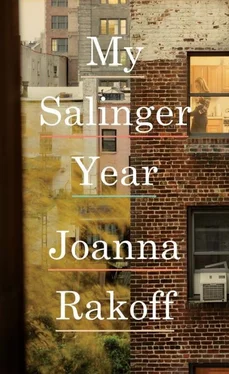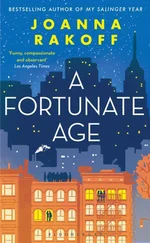And then I got back in the elevator without so much as a word, a glance, exchanged with another soul. In the lobby, I fought a crushing disappointment. That was it? Really? I thought as I walked up Madison, the wind sneaking through the weave of my sweater. The feverish anticipation of the morning dissolved in a haze of anguish and regret.
Across the avenue stood the entrance to the Agency’s building, but I couldn’t bear the thought of returning to my desk just yet. I had imagined—what?—spending an hour chatting with witty editors? Oh God, how stupid . With a shiver, I turned west on Forty-Ninth, where the wind hit me full in the face. It was just noon, still early for lunch, and the streets were eerily empty, the workers of midtown safely ensconced in their overheated offices, endlessly picking up the ringing phone, sending out missives via optic cable, closing deals and crunching numbers and cutting film, their minds on where they would pick up their sandwiches or sushi half an hour hence.
At the corner of Fifth, I paused by the windows of Saks, already dressed for the holidays, with mannequins in beautifully draped crepe dresses, the deeply saturated colors of the season: red, maroon, pine green. Tourists flowed past me in clusters of four and five and six, en route to more elaborate window displays—Tiffany’s, Bergdorf’s, Bendel’s—or Central Park, so close and yet I’d never ventured up there on my lunch break. I’d eaten lunch at my desk pretty much every day during my year at the Agency. Why had I never thought of taking my salads to a bench, sitting in the sun, or walking around the pond, or up to the zoo?
In five minutes I was at the southeast entrance—past the Paris Theatre and the Plaza, and the rows of horse-drawn carriages, sidestepping piles of manure. There it was: the park. The acres of fields, the winding, intersecting paths, unfolding before me. I had played here as a kid, too, climbing the Alice in Wonderland statue, clambering through various playgrounds, feeding the ducks. Holden’s ducks. The huge, beautiful willows that dipped low over the pond were bare of leaves, their frilly branches spinning in the wind. I was freezing by now, my hands red and raw, my fingers numb. Tucking them under my arms, I walked down the sloping path to the pond. Holden calls it the lagoon—a word that for me connoted magic, the mermaids of Peter Pan —but in my family we’d just called it the pond. And there it was, the water black and sluggish, foreboding, a few rays of sun slicing across its center. Brown sparrows hopped around the path in front of me, and a pigeon or two fluttered down from the back of a bench at the prospect of food. But there were, indeed, no ducks. It was colder here, in the pond’s little vale, the wind whipping down from the top of the park. The wind clicks around to the north , I thought. Merwin’s most beautiful, most compressed, most perfect poem, written for his first wife, Dido. I walked into it, my eyes watering, to the little curved bridge that crosses the pond, and looked up, toward the grand buildings on Fifth, the trees that stretched beyond, the path that led to the zoo—where Holden takes Phoebe, and where I, too, had watched the seals bark for fish, water sloshing over the edge of their tank. And then, suddenly, from the north—yes—came the unmistakable sound of moving water. Ducks. A fleet of them coming toward me with calm fortitude, brown mallard females of varying sizes. Fifteen, twenty of them, their feathers lush and fluffed. They swam under the bridge and I turned to watch them enter the pond proper, circling its perimeter in search of insects or tiny fish or scraps of sandwiches left by hearty cold-weather picnickers. They were so beautiful, the ducks, so beautiful and sweet, gliding with regal grandeur across the black depths of the pond, their million tiny feathers protecting them from the cold.
That afternoon, when the mail came in, there was a letter for me, with a Nebraska return address. Inside, I unfolded two sheets of small white paper covered over in large, shaky letters. The veteran. “Dear Miss Rakoff,” he wrote.
I was very pleased to receive your letter last week. Of course, I’m sorry that Mr. Salinger isn’t interested in seeing his mail, but I’m not surprised either. I didn’t really expect or even want a response. I just wanted him to know how much his work meant to me. I very much appreciate the time you took to write back and I enjoyed reading your thoughts on Mr. Salinger’s work. I’m sure you’re too young to have lived through World War II, but it was a terrible time for those of us who served. Maybe your father served? Or your grandfather? In fact, I knew a man named Rakoff during my time in the air force. We were stationed together in Germany just after the war. Was this perhaps your father or grandfather or uncle? It’s an unusual name. I’d never met another person named Rakoff until your letter came.
My heart began to speed up a little. My father had, in fact, been in the air force and had, in fact, been stationed in Germany . In Stuttgart. But years later, during the Korean War. He’d enlisted, I believed, in 1952, a year after Catcher came out and a year after he and my mother married. Could the veteran have done another tour, during the Korean War, and met my father? Now, in his dotage, was he conflating the two?
I set the letter aside, heart still beating. Could my father have met this man? How I wanted this to be so. Quietly, I picked up the phone’s heavy receiver and began to punch in the numbers of my father’s office. From her sanctum, my boss coughed heavily and shuffled some papers. I put the phone down. Before I could take my hand away, it rang, and I jumped a little in my seat. “I’m calling for Joanna Rakoff,” announced an unfamiliar voice.
“This is she,” I said.
“Yes, this is ——.” The caller uttered a name that meant nothing to me, but in such a tone that I understood he thought us acquainted. I racked my brain trying to think who this might be. “You sent us a story a few weeks ago. I’m sorry it’s taken me so long to get back to you.” The editor of the small magazine. I’d expected a letter from him, or his assistant, not a call. “Well, I finally read it last night and I can’t get it out of my head. We’d be very pleased to accept it for the magazine.”
“Wonderful.” I wasn’t sure what else to say. “Thank you so much for taking a look at it.”
“Thank you for thinking of us.” He had the sort of gruff voice I associated with the Far West. “We’d love to see more from your writers.” My writers , I thought, smiling. My writers .
“Oh my goodness,” my boss cried, when I told her. “I knew you could do it.” She beamed at me. “You’re on your way.” Then she stood—with a heaviness that had not been evident when I’d started—and motioned for me to walk out into my antechamber with her. Her gait reminded me of Leigh, those long draggy walks through the apartment. “Hugh,” she called, smiling. “Joanna sold a story.”
“That’s great,” said Hugh, with an avuncular smile.
“Yep, a hard sell. Very quiet story.” She nodded for emphasis. “She found me a new client, too.” My eyes widened at this. “I’m taking on that girl you pulled from the slush. The second novella is very good. I’m not sure how I’m going to sell it. I have to think. Apparently, she has a novel.” She turned to Hugh. “These are very spare, eerie tales. Very good. Very elegant.” They both turned and smiled at me, as if they were my parents. “I knew from the moment you walked in the door,” said my boss, lighting a cigarette, “that you were an Agency Type of Person.”
That night, I raced to meet Don at the L, only to find the small, makeshift room filled to capacity, with people standing by the door, waiting for tables to open up. Our neighborhood, all of a sudden, was teeming with the young and underemployed, scads of twenty-two-year-olds, fresh out of Brown and Wesleyan and Bard, having arrived after summers backpacking through France or surfing in Mexico. Increasingly, people we knew were moving north, to Greenpoint—the little neighborhood just above Williamsburg, still predominantly Polish, where good deals could still be had on linoleum-floored railroad apartments—or east, to the Italian neighborhood one stop farther in on the train, the Lorimer Street stop, by Leigh and Don’s old apartment. Just a year earlier, when I’d camped out there, the latter had been considered a murky, marginal neighborhood.
Читать дальше












